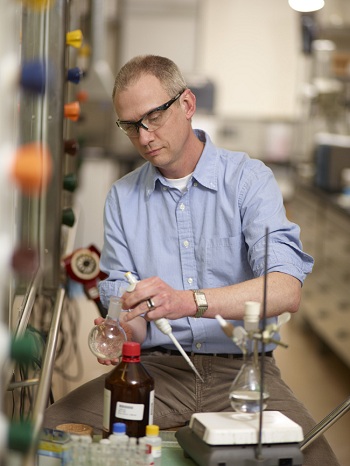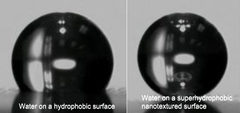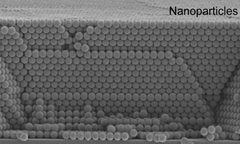
Name Matthew Butts
- Education Ph. D. in Chemistry, B.S. in Chemistry
- Target Audience Elementary School

Chemistry may not be the first subject that comes to your mind when you think of medical technology. In reality, chemists like Matthew Butts are on the cutting-edge of medical technology, working hard in the fight to treat cancer and other major illnesses. Read on to find out why chemistry is such a major part of the medical field.
I am a chemist at GE Global Research in New York, and basically I solve technical problems. I'm part of our nanotechnology lab and my work focuses on 2 main areas. (1) The development of new drug delivery technology which, if successful, will allow for the treatment of cancer and other diseases in ways and with effectiveness that are not possible today. (2) New coating technology to allow wind turbines and aircraft to operate more efficiently. A common theme in all my work is surface modification, or the ability to manipulate the surface properties of different materials.
I've always been interested in science in general. I chose chemistry because of a basic curiosity about what materials are made of and how molecules are made. When I was younger, my view, and it is still true today, was that chemists get to invent and make new molecules and materials that have never been made before, and apply that creativity in solving important problems. I wanted to learn how to do that.
I was always better in science and math than any other classes, so that reinforced my basic interests. I really liked math a lot but I chose chemistry over math because I felt like I could do more with it. I wouldn't just be sitting at a computer, but I would get to work in the lab setting and I would get to make things. Math is great, but I really liked the hands-on part of chemistry.
 No two days are alike. On any given day I might do experiments in the lab, spend time developing technical strategy or interpreting data, meet with colleagues to discuss results and plans, work on new ideas, attend a technical seminar, report out on progress to management, or present demonstrations to visitors on why nanotechnology is cool and relevant. The only thing that is common to every day is that I always go home having learned something new. I can't think of a single day I've ever gone home and not learned something.
No two days are alike. On any given day I might do experiments in the lab, spend time developing technical strategy or interpreting data, meet with colleagues to discuss results and plans, work on new ideas, attend a technical seminar, report out on progress to management, or present demonstrations to visitors on why nanotechnology is cool and relevant. The only thing that is common to every day is that I always go home having learned something new. I can't think of a single day I've ever gone home and not learned something.
 I really enjoy what I am working on now. We are developing new ways to deliver drugs in humans that are not possible today. There are certain types of cancer drugs that can't currently be commercialized or used widely because they are either not soluble enough in blood, have side effects that prevent their wide use or just can't be delivered right to where they are needed. We're trying to figure out how to deliver drugs in new ways that get around those problems. This will really open the door to a lot of therapeutic applications that currently cannot be practiced. I think it is very easy for people to understand why we would want to do these things. I also like the fact that I get to work on a multidisciplinary team - I work very closely with biologists and also hardware engineers. I think this area also has huge potential for growth.
I really enjoy what I am working on now. We are developing new ways to deliver drugs in humans that are not possible today. There are certain types of cancer drugs that can't currently be commercialized or used widely because they are either not soluble enough in blood, have side effects that prevent their wide use or just can't be delivered right to where they are needed. We're trying to figure out how to deliver drugs in new ways that get around those problems. This will really open the door to a lot of therapeutic applications that currently cannot be practiced. I think it is very easy for people to understand why we would want to do these things. I also like the fact that I get to work on a multidisciplinary team - I work very closely with biologists and also hardware engineers. I think this area also has huge potential for growth.
I get to work with great people in solving some of the world's toughest problems in a great research facility.
I have liked science and math for as long as I can remember. I was better in these subjects than in, say, English class, and that reinforced my interest. Once I started taking high school math classes I knew technical subjects were a good fit for me. It wasn't a very hard call for me to go towards science. I also always had an interest in healthcare and medicine, and there was a time that I thought I wanted to major in chemistry as a way to get to medical school instead of going the traditional biology route. But by the time I finished my freshman year in college I knew that I would rather do chemistry with a Ph.D. than to actually pursue medical school.
I knew that science in general was right for me in 9th grade. I chose chemistry when I took my first chemistry class in 10th grade. I wanted to learn how to make new molecules and materials. I thought for a while I might use a chemistry background as a path towards medical school, but that changed as I learned more about chemistry in college.
I never really had any doubts once I started college, although I did struggle in one class - graduate level physical organic chemistry. I got regular help from my professor and eventually figured it out, which was very satisfying. I enjoyed the challenge of difficult classes and I gained great satisfaction when I was able to figure it out before the class was finished.
 The person who had the greatest influence on the path I took in college was the chemistry professor with whom I did undergraduate research in college. He exposed me to real research for the first time and gave me great advice. The person who had the biggest influence overall in my career was my Ph.D. advisor. From him I learned how to do original research, and he provided an excellent environment in which to do it.
The person who had the greatest influence on the path I took in college was the chemistry professor with whom I did undergraduate research in college. He exposed me to real research for the first time and gave me great advice. The person who had the biggest influence overall in my career was my Ph.D. advisor. From him I learned how to do original research, and he provided an excellent environment in which to do it.
At GE GRC each year we have ‘Science Day', during which we host 4th grade students for ½ day and show them lots of cool demonstrations about science and engineering. There is a chemistry magic show and we do demos in other focus areas of chemistry like nanotechnology. Look to see if there are any of these types of opportunities in your area.
 Absolutely, but I'll just call out one area - healthcare. We are now developing new, more accurate technologies for diagnosing and sometimes predicting diseases that will allow for great improvements in health and quality of life, for example in the area of Alzheimer's disease. In general, advances in therapy and therapy monitoring which give doctors new tools are being made rapidly. This research involves collaborations between chemistry, biology, software engineering and hardware engineering, and this collaboration is much more extensive than in previous years. That's not going to change.
Absolutely, but I'll just call out one area - healthcare. We are now developing new, more accurate technologies for diagnosing and sometimes predicting diseases that will allow for great improvements in health and quality of life, for example in the area of Alzheimer's disease. In general, advances in therapy and therapy monitoring which give doctors new tools are being made rapidly. This research involves collaborations between chemistry, biology, software engineering and hardware engineering, and this collaboration is much more extensive than in previous years. That's not going to change.
It's hard to predict what a career will look like in 15 years. But we know that science and engineering will define innovation in technology.
Alzheimer's Disease: A common form of dementia of unknown cause, usually beginning in late middle age, characterized by memory lapses, confusion, emotional instability, and progressive loss of mental ability.
Nanotechnology: A technology executed on the scale of less than 100 nanometers (a nanometer is one billionth of a meter), the goal of which is to control individual atoms and molecules, especially to create computer chips and other microscopic devices.
Soluble: Capable of being dissolved or liquefied.
Abdul Yassine is a senior biology major and soccer player at Southern M…
Melissa Wallace is an SMU alumna who studied Mechanical Engineering. Sh…
Do you love music and science? Do you think you have to choose just one…